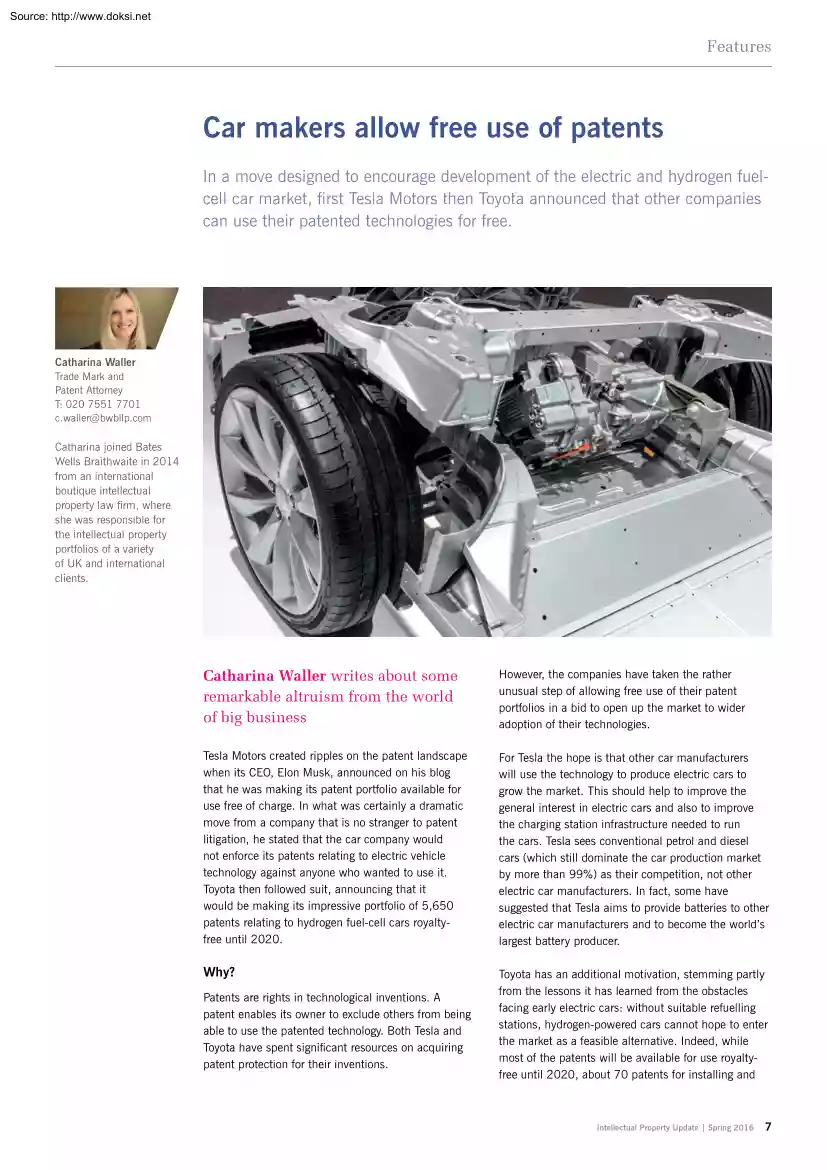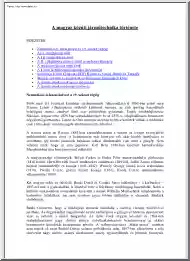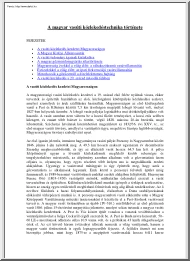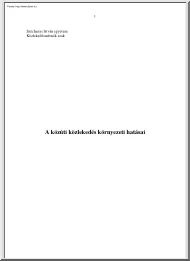Datasheet
Year, pagecount:2016, 2 page(s)
Language:English
Downloads:3
Uploaded:October 21, 2019
Size:1 MB
Institution:
-
Comments:
Attachment:-
Download in PDF:Please log in!
Comments
No comments yet. You can be the first!Most popular documents in this category
Content extract
Source: http://www.doksinet Features Car makers allow free use of patents In a move designed to encourage development of the electric and hydrogen fuelcell car market, first Tesla Motors then Toyota announced that other companies can use their patented technologies for free. Catharina Waller Trade Mark and Patent Attorney T: 020 7551 7701 c.waller@bwbllpcom Catharina joined Bates Wells Braithwaite in 2014 from an international boutique intellectual property law firm, where she was responsible for the intellectual property portfolios of a variety of UK and international clients. Catharina Waller writes about some remarkable altruism from the world of big business However, the companies have taken the rather unusual step of allowing free use of their patent portfolios in a bid to open up the market to wider adoption of their technologies. Tesla Motors created ripples on the patent landscape when its CEO, Elon Musk, announced on his blog that he was making its patent portfolio
available for use free of charge. In what was certainly a dramatic move from a company that is no stranger to patent litigation, he stated that the car company would not enforce its patents relating to electric vehicle technology against anyone who wanted to use it. Toyota then followed suit, announcing that it would be making its impressive portfolio of 5,650 patents relating to hydrogen fuel-cell cars royaltyfree until 2020. For Tesla the hope is that other car manufacturers will use the technology to produce electric cars to grow the market. This should help to improve the general interest in electric cars and also to improve the charging station infrastructure needed to run the cars. Tesla sees conventional petrol and diesel cars (which still dominate the car production market by more than 99%) as their competition, not other electric car manufacturers. In fact, some have suggested that Tesla aims to provide batteries to other electric car manufacturers and to become the world’s
largest battery producer. Why? Toyota has an additional motivation, stemming partly from the lessons it has learned from the obstacles facing early electric cars: without suitable refuelling stations, hydrogen-powered cars cannot hope to enter the market as a feasible alternative. Indeed, while most of the patents will be available for use royaltyfree until 2020, about 70 patents for installing and Patents are rights in technological inventions. A patent enables its owner to exclude others from being able to use the patented technology. Both Tesla and Toyota have spent significant resources on acquiring patent protection for their inventions. Intellectual Property Update | Spring 2016 7 Source: http://www.doksinet Features operating hydrogen fuelling stations will be available indefinitely. Additionally, the portfolio covers fuelcell stacks, high-pressure hydrogen tanks, software control systems and the industrial processes involved in generating and supplying the gas.
Toyota hopes that this will help to further refine new fuel-cell components to increase performance, reduce costs, and attract a broader market of buyers. Can literally anyone use them? Well, not quite. Naturally, having spent considerable resources on acquisition of the patents, the companies want to retain some form of control over the direction of subsequent development. Toyota confirmed that there will be an application process to check what the technology will be used for and then a royalty-free licence will be issued. Tesla’s brief blog statement was less specific, but included the caveat that the use of the technology must be ‘in good faith’. In this way, the companies can ensure that the technology is not used for commercially detrimental purposes or for morally uncertain purposes, which could include, for example, military applications. Are patents still worthwhile? With these car makers having spent the resources on building impressive patent portfolios, only to then
grant royalty-free licenses, it is fair to ask whether it is worth obtaining patent protection in the first place. The answer is yes, absolutely. There were reports that, shortly after the announcement, both Nissan and BMW were in talks with Tesla. Without the patent portfolio to become the frontrunner in electric car battery technology in the first place, Tesla would not have had the bargaining power it now has to encourage development of its chosen market. ‘With these car makers having spent the resources on building impressive patent portfolios, only to then grant royalty-free licenses, it is fair to ask whether it is worth obtaining patent protection in the first place. The answer is yes, absolutely’ 8 Intellectual Property Update | Spring 2016 Patent lawyers Our specialist patent attorney and IP solicitors team support businesses and individuals throughout the entire process of protecting an invention, from concept to registered patent and beyond. We often work with
the inventor to further refine and define the scope of the invention for patenting purposes. Our patent service covers the whole life cycle of a patent, from consultation and analysis of your patent protection options, through to registration and licensing and enforcement. For more information, please refer to our patent pages at www.bwbllpcom/services/patents/
available for use free of charge. In what was certainly a dramatic move from a company that is no stranger to patent litigation, he stated that the car company would not enforce its patents relating to electric vehicle technology against anyone who wanted to use it. Toyota then followed suit, announcing that it would be making its impressive portfolio of 5,650 patents relating to hydrogen fuel-cell cars royaltyfree until 2020. For Tesla the hope is that other car manufacturers will use the technology to produce electric cars to grow the market. This should help to improve the general interest in electric cars and also to improve the charging station infrastructure needed to run the cars. Tesla sees conventional petrol and diesel cars (which still dominate the car production market by more than 99%) as their competition, not other electric car manufacturers. In fact, some have suggested that Tesla aims to provide batteries to other electric car manufacturers and to become the world’s
largest battery producer. Why? Toyota has an additional motivation, stemming partly from the lessons it has learned from the obstacles facing early electric cars: without suitable refuelling stations, hydrogen-powered cars cannot hope to enter the market as a feasible alternative. Indeed, while most of the patents will be available for use royaltyfree until 2020, about 70 patents for installing and Patents are rights in technological inventions. A patent enables its owner to exclude others from being able to use the patented technology. Both Tesla and Toyota have spent significant resources on acquiring patent protection for their inventions. Intellectual Property Update | Spring 2016 7 Source: http://www.doksinet Features operating hydrogen fuelling stations will be available indefinitely. Additionally, the portfolio covers fuelcell stacks, high-pressure hydrogen tanks, software control systems and the industrial processes involved in generating and supplying the gas.
Toyota hopes that this will help to further refine new fuel-cell components to increase performance, reduce costs, and attract a broader market of buyers. Can literally anyone use them? Well, not quite. Naturally, having spent considerable resources on acquisition of the patents, the companies want to retain some form of control over the direction of subsequent development. Toyota confirmed that there will be an application process to check what the technology will be used for and then a royalty-free licence will be issued. Tesla’s brief blog statement was less specific, but included the caveat that the use of the technology must be ‘in good faith’. In this way, the companies can ensure that the technology is not used for commercially detrimental purposes or for morally uncertain purposes, which could include, for example, military applications. Are patents still worthwhile? With these car makers having spent the resources on building impressive patent portfolios, only to then
grant royalty-free licenses, it is fair to ask whether it is worth obtaining patent protection in the first place. The answer is yes, absolutely. There were reports that, shortly after the announcement, both Nissan and BMW were in talks with Tesla. Without the patent portfolio to become the frontrunner in electric car battery technology in the first place, Tesla would not have had the bargaining power it now has to encourage development of its chosen market. ‘With these car makers having spent the resources on building impressive patent portfolios, only to then grant royalty-free licenses, it is fair to ask whether it is worth obtaining patent protection in the first place. The answer is yes, absolutely’ 8 Intellectual Property Update | Spring 2016 Patent lawyers Our specialist patent attorney and IP solicitors team support businesses and individuals throughout the entire process of protecting an invention, from concept to registered patent and beyond. We often work with
the inventor to further refine and define the scope of the invention for patenting purposes. Our patent service covers the whole life cycle of a patent, from consultation and analysis of your patent protection options, through to registration and licensing and enforcement. For more information, please refer to our patent pages at www.bwbllpcom/services/patents/





 When reading, most of us just let a story wash over us, getting lost in the world of the book rather than paying attention to the individual elements of the plot or writing. However, in English class, our teachers ask us to look at the mechanics of the writing.
When reading, most of us just let a story wash over us, getting lost in the world of the book rather than paying attention to the individual elements of the plot or writing. However, in English class, our teachers ask us to look at the mechanics of the writing.